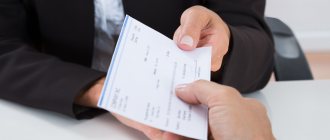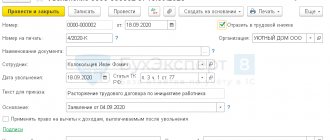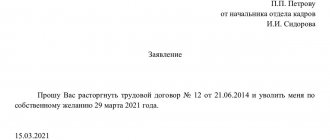We terminate the contract due to circumstances beyond the control of the parties
The air traffic controller was fired under clause 9, part 1, art. 83 Labor Code of the Russian Federation. Considering his dismissal illegal, he filed a lawsuit for reinstatement at work. The court found that the plaintiff worked as a dispatcher, directly controlling the movement of aircraft. The plaintiff, as a special document (license), had a traffic service dispatcher certificate, which expired on January 15, 2011 (according to the mark on the certificate). The plaintiff had access to international flights valid until September 18, 2010 and the third level of language competence on the ICAO scale. In accordance with the certificate, in 2010 the plaintiff confirmed the third level of language competence on the ICAO scale, but received insufficient points in testing conducted by the employer. This fact was perceived by the employer as depriving the employee of the right to work as a dispatcher in international transportation. After this, the employer, in accordance with Part 2 of Art. 83 of the Labor Code of the Russian Federation offered the plaintiff vacancies, which he refused.
However, the court did not agree with the employer's conclusions. Having analyzed the legal requirements for aviation personnel, the court came to the conclusion that the dismissal of the plaintiff, working as a dispatcher who directly controls the movement of aircraft, classified as a civil aviation personnel position, in accordance with clause 9, part 1, art. 83 of the Labor Code of the Russian Federation could be permissible only in cases of expiration of the special right to air traffic control established by Art. 52 of the Air Code of the Russian Federation; suspension of the special right to control air traffic for a period of more than two months; deprivation of an employee of a special right to air traffic control. The specified special right is formalized in the form of a dispatcher certificate, which is issued to the employee (and is also suspended, limited and canceled) by the authorized bodies of the Federal Air Transport Agency. The employer is not an authorized body with the right to issue, suspend, limit and cancel the validity of a dispatcher’s certificate. At the time of dismissal, the plaintiff’s certificate issued by the Federal Air Transport Agency had not yet expired.
In addition, persons who have access to flight services using English take advanced training courses in their specialty and in English under a combined program. Thus, the court also found that separate testing in English, in isolation from testing in core disciplines, carried out by the employer in relation to the plaintiff, did not comply with current legislation. Consequently, the results of testing for the plaintiff’s English language proficiency at the end of training do not provide grounds for the employer to dismiss the employee under clause 9. Part 1 of Art. 83 Labor Code of the Russian Federation. Based on the above, the court came to the conclusion that the plaintiff’s dismissal was illegal and reinstated him in the position of dispatcher (decision of the Savyolovsky District Court of Moscow dated February 10, 2011 in case No. 2-485/11)4.
Article 83. Termination of an employment contract due to circumstances beyond the control of the parties
Determination of the Constitutional Court of the Russian Federation dated November 17, 2009 N 1374-О-О 2.5. Part one of the article of the Labor Code of the Russian Federation contains a list of grounds for terminating an employment contract due to circumstances beyond the will of the parties, does not define the procedure for terminating an employment contract in the event of a court decision to reinstate the employee at work, and cannot in itself be considered as violating the constitutional rights of citizens .
Determination of the Constitutional Court of the Russian Federation dated July 15, 2010 N 1004-О-О
1. In her complaint to the Constitutional Court of the Russian Federation, citizen L.Ya. Andrienko challenges the constitutionality of paragraph 5 of part one of Article of the Labor Code of the Russian Federation, according to which the employment contract is subject to termination due to the recognition of the employee as completely incapable of working in accordance with a medical certificate issued in the manner established by federal laws and other regulatory legal acts of the Russian Federation. According to the applicant, this legal provision contradicts Articles 7, 19 (parts 1 and 2), 37 (part 1) and 55 (part 2) of the Constitution of the Russian Federation. Contested L.Ya. Andrienko, the norm was applied in her case by the courts of general jurisdiction.
Determination of the Constitutional Court of the Russian Federation dated September 29, 2011 N 1058-О-О
1. In her complaint to the Constitutional Court of the Russian Federation, citizen V.Ya. Kydyeva challenges the constitutionality of paragraph 11 of part one of Article of the Labor Code of the Russian Federation, which specifies cases of termination of an employment contract due to circumstances beyond the control of the parties: in connection with the reversal of a court decision or the cancellation (declare illegal) of a decision of the state labor inspectorate to reinstate an employee at work .
Determination of the Supreme Court of the Russian Federation dated December 7, 2012 N 52-KGPR12-1
In support of the stated demands, the prosecutor referred to the fact that by order of the director of the municipal educational institution “Gymnasium N ... of Gorno-Altaisk” dated March 18, 2003 N 75, Kazakov K.A. was hired as a teacher, with whom a labor contract was concluded on August 31, 2009 contract for an indefinite period. By virtue of the assigned duties, Kazakov K.A. directly carries out functions related to the upbringing and education of children. Meanwhile, he has two criminal records: convicted by the verdict of the Shebalinsky District Court of the Altai Republic dated June 16, 1995 under Part 2 of Article 211 of the Criminal Code of the RSFSR and by the verdict of the Gorno-Altai City Court of the Altai Republic dated November 20, 2001 under Article 119 of the Criminal Code of the Russian Federation. Thus, on Kazakov K.A. the restrictions provided for in part two of Article 331 of the Labor Code of the Russian Federation apply, and therefore the employment contract with him is subject to termination on the basis of paragraph 13 of part one of Article 331 of the Labor Code of the Russian Federation.
Determination of the Constitutional Court of the Russian Federation dated September 24, 2012 N 40-PRP
Having studied the complaint of citizen K.G. Maksimov for violation of his constitutional rights by paragraph 9 of part one of article of the Labor Code of the Russian Federation, established: By ruling dated May 29, 2012 N 850-O, the Constitutional Court of the Russian Federation refused to accept citizen Konstantin Grigorievich Maksimov for consideration of his complaint about the violation of his constitutional rights by paragraph 9 part one of article of the Labor Code of the Russian Federation due to the fact that it did not meet the requirements of the Federal Constitutional Law “On the Constitutional Court of the Russian Federation”, according to which a complaint to the Constitutional Court of the Russian Federation is considered admissible.
Determination of the Supreme Court of the Russian Federation dated 01.02.2013 N 52-KGPR12-4
The Deputy Prosecutor of the Chemalsky District of the Altai Republic filed a lawsuit in the interests of an indefinite number of minors of the Municipal Preschool Educational Institution "Kindergarten" ... "against the Education Department of the Administration of the Municipal Municipality "Chemalsky District" to declare illegal the inaction of the head of the education department of the administration of the Municipal Municipality "Chemalsky District" in not taking measures, aimed at terminating the employment relationship with Tadinova O.V., working as the head of the MDOU "Kindergarten" ... ", and imposing the obligation on the head of the education department of the administration of the municipal district "Chemalsky district" to terminate the employment contract with Tadinova O.V. if it is impossible to transfer her to another job after the court decision enters into legal force, the justification for which was based on the fact that the district prosecutor's office conducted an inspection of compliance with labor legislation at the kindergarten "Kindergarten" ... ". E; During the inspection, it was established that by order of the head of the Education Department of the Administration of the Chemalsky District Municipal District dated September 27, 2000, Tadinov O.V. was appointed to the position of head of the preschool educational institution “Kindergarten” ... “, due to the duties assigned to her, she directly carries out labor functions in the field of education related to the training and education of minors of preschool age. According to the certificate of the information center of the Ministry of Internal Affairs for the Altai Republic dated September 20, 2011, Tadinova O.V. was convicted by the verdict of the Chemalsky District Court on June 8, 2007 under Part 1 of Art. 236 of the Criminal Code of the Russian Federation (failure to comply with the requirements of sanitary legislation). Thus, on Tadinova O.V. the restrictions provided for in the second part of Article 331 and Article 351.1 of the Labor Code of the Russian Federation apply, and therefore the employment contract with her is subject to termination on the basis of paragraph 13 of the first part of Article of the Labor Code of the Russian Federation.
Determination of the Constitutional Court of the Russian Federation dated September 24, 2013 N 1249-O
1. In his complaint to the Constitutional Court of the Russian Federation, citizen V.A. Mokrushin, dismissed from the position of a teacher at a municipal educational institution under paragraph 13 of part one of Article of the Labor Code of the Russian Federation (the emergence of restrictions on engaging in certain types of labor activities established by this Code and other federal law and excluding the possibility of an employee fulfilling obligations under an employment contract), challenges the constitutionality of the following provisions of the said Code:
Determination of the Constitutional Court of the Russian Federation dated October 10, 2013 N 1514-O
By order of February 1, 2013 V.V. Zubkov was dismissed under paragraph 13 of part one of article of the Labor Code of the Russian Federation (the emergence of restrictions on engaging in certain types of labor activities established by this Code and other federal law and excluding the possibility of an employee fulfilling obligations under an employment contract). By the decision of the Syktyvkar City Court of the Komi Republic dated June 6, 2013 (came into legal force on July 11, 2013) V.V. Zubkov was refused to satisfy his demands for recognition of the dismissal as illegal, reinstatement as a teacher, recovery of wages for the period of forced absence and compensation for moral damage.
Determination of the Constitutional Court of the Russian Federation dated September 17, 2013 N 1302-O
As follows from the presented materials, A.V. On August 13, 2009, Schuchenko was hired as a labor instructor at the municipal educational institution “Cadet boarding school for orphans and children left without parental care of the Barabinsky district of the Novosibirsk region,” which was subsequently renamed the municipal government educational institution “School- boarding school for orphans and children left without parental care “Cadet Baraba”, Barabinsky district, Novosibirsk region.” By order of March 13, 2012, she was dismissed under paragraph 13 of part one of Article of the Labor Code of the Russian Federation (the emergence of restrictions on engaging in certain types of labor activities established by this Code and other federal laws and excluding the possibility of an employee fulfilling obligations under an employment contract).
Determination of the Constitutional Court of the Russian Federation dated September 17, 2013 N 1303-O
As follows from the presented materials, N.L. On November 1, 2000, Berlyakov was hired as an athlete-instructor, and on September 3, 2009, he was appointed to the position of senior coach-teacher of the highest category at the municipal budgetary institution of additional education for children “Sports Palace for Children and Youth in the City of Inta” (Komi Republic ). By order of February 13, 2012, the employment contract with him was terminated under paragraph 13 of part one of Article of the Labor Code of the Russian Federation (the emergence of restrictions on engaging in certain types of labor activities established by this Code and other federal laws that exclude the possibility of the employee fulfilling obligations under the employment contract). The reason for the dismissal was the submission of the prosecutor of the city of Inta dated December 21, 2011, sent to the director of this municipal budgetary institution, which indicated that N.L. Berlyakov, being a minor, was sentenced by the Inta City Court on August 28, 2000 to three years and six months of suspended imprisonment with a probationary period of one year and six months for committing crimes under the third part of Article 30, paragraph “a” of the second part of Article 159 and subparagraphs “a”, “b” of part two of Article 163 of the Criminal Code of the Russian Federation (attempted fraud committed by a group of persons; extortion committed repeatedly by a group of persons).
Determination of the Constitutional Court of the Russian Federation dated September 17, 2013 N 1306-O
As follows from the presented materials, A.A. Samkov, by order of August 29, 2008, was hired as deputy director for the economic department of the municipal educational institution "Staropershinskaya Secondary School" (Mokrousovsky district, Kurgan region), and by order of February 20, 2013, he was fired under clause 13 of part one of the Labor Code. Code of the Russian Federation (the emergence of restrictions on engaging in certain types of labor activity established by this Code, other federal law and excluding the possibility of an employee fulfilling obligations under an employment contract) on the proposal of the prosecutor of the Mokrousovsky district of the Kurgan region. As stated in the submission, A.A. Samkov was brought to criminal liability for committing a crime provided for in part one of Article 112 of the Criminal Code of the Russian Federation (intentional infliction of moderate harm to health, not dangerous to human life and not entailing the consequences specified in Article 111 of this Code, but causing long-term health problems or significant permanent loss of general ability to work by less than one third), however, criminal prosecution against him was terminated on May 26, 2001 under Article 9 of the Code of Criminal Procedure of the RSFSR in connection with reconciliation with the victim.
Disqualification or administrative punishment and termination of the employment contract
For various administrative offenses provided for by the law of the Russian Federation, a person can be disqualified, deprived of the right to conduct certain activities, hold any positions for a certain period, or a person without a fixed place of residence, a foreigner, can be expelled from the Russian Federation.
Dismissal due to administrative punishment or disqualification of an employee occurs on the basis of Article 83 of the first part of paragraph 8 according to the norms provided for in paragraph 9 of the same article of the Labor Code of Russia.
An employee can be dismissed only by a court verdict, indicating in the order the date of the verdict and the number of the case in which the court hearing was held.
As in all cases of dismissal, the employee must be familiarized with the order against signature. In case of refusal to sign, a corresponding act is drawn up. On the day of dismissal, the former employee is given a work book and full cash payment.









